Hamlet, 1948, directed by Laurence Olivier, screenplay by Laurence Olivier and Alan Dent, from the play by William Shakespeare.
Staging Hamlet requires a special sort of madness, feigned or genuine. It's not just the greatest work in Western literature. It's not just the most fully realized portrait of human consciousness and self-consciousness, with all the miserable paradoxes they entail. The situation's a little more serious. To quote the never-bombastic Harold Bloom, "Hamlet and Western self-consciousness have been the same for about the last two centuries of Romantic sensibility." Embodying Western self-consciousness: now there's an easily achievable goal for a filmmaker! And given that you have no chance of creating a definitive version of literature's "center of centers," one wonders if it's really worth the trouble. I hope no one attempts Hamlet for critical acclaim. It's true that films of Shakespeare inevitably get tarred with the middlebrow prestige brush, but the best one can hope for from serious critics (i.e., those who know Shakespeare well) are left-handed compliments like the one James Agee gave Olivier in his review for Time:
A man who can do what Laurence Olivier is doing for Shakespeare—and for those who treasure or will yet learn to treasure Shakespeare—is certainly among the more valuable men of his time.
I suppose Olivier managed to console himself with his Best Actor and Best Picture Academy Awards, but still. For a critic like Agee, the Oliver Shakespeare films are valuable to the extent they point viewers back to the texts, the platonic ideals. And any account of an individual staging of the play is necessarily a list of ways the specific instance falls short of the general case. To paraphrase the lines Olivier chooses as an epigraph:
...these [productions of Hamlet]
Carrying, I say, the stamp of one defect
Their virtues else—be they as pure as grace,
Shall in the general censure take corruption
From that particular fault.
But like Everest, Hamlet is there, and theatrical minds of all calibers will continue to try to scale it. It was inevitable that Olivier would make the attempt. I'll talk about his film's particular faults in a moment, but first, here's what this version gets right.
It seems to me that the worst mistake you can make with Hamlet is to try to bind it to a specific place and time. The play tells us so much about what it is to be human, and so little about Denmark (and nothing about the 19th Century or, God forbid, Wall Street). Olivier nails this: his Elsinore is an abstraction from the very first shot:

You wouldn't call the costumes or sets minimalist, exactly (that would be its own aesthetic distraction), but they offer no respite from the text's relentless claustrophobia. I've always thought Branagh's lush colors (in 70mm, no less), worked against Hamlet, not for it. In the Olivier version, Roger Furse's sets and costumes and Desmond Dickenson's stark black and white photography work together to make Denmark the prison Hamlet proclaims it.

Dickenson's camera stitches the film together by tracking cooly down empty, narrow hallways from one scene to the next: it's a crib from the cinematic grammar of horror films, used to great effect here.

Even when we leave Elsinore for the outside world, as in Ophelia's death (presented with Gertrude's description as voiceover), we're still dealing with abstraction. Compare Jean Simmons's Ophelia:

To John Everett Millais's:

I suppose you could make a case that the visual quotation is distracting, but consider its import: Olivier is reminding us that we're not seeing the specific death of a young Danish woman, but the archetypical death of Ophelia, one presentation of thousands. The emphasis is on abstraction and timelessness, which I find completely appropriate.
This is not to say that the abstracted sets and costumes mean that Olivier doesn't have his own take on the play. He certainly embraced some of Freud's interpretation, going so far as to cast Eileen Herlie as Gertrude. She was 13 years younger than her putative son, which made the Oedipal overtones in the closet scene pretty easy to play:

Herlie's performance astonishingly good, and she's the focus of the most unnerving choice the filmmakers made. Here's how she toasts Hamlet in Act V:

Her expression was revelatory for me. Of course Gertrude knows the cup is poisoned—she knows more about Claudius than anyone else in the room.
Olivier plays Hamlet indelibly enough that every film version that has followed is compared to his version. He emphasizes Hamlet's brooding melancholy, perhaps to the detriment of his quick wit, which is not as much in evidence here:
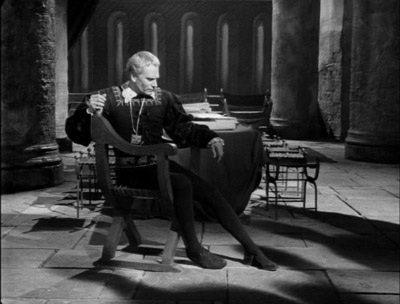
Terrence Rafferty disagrees with me about this; in the essay that accompanies the DVD, he writes
...the striking feature of this performance—as of the whole production—is its atypical vigor: Olivier may be the only actor who has fully recognized that Hamlet’s irresolution has its own fierce energy, and that his morbidity is, at heart, a kind of ardor.
Rafferty's right to note that Olivier gains energy as the play advances, but both Gibson and Branagh gave their versions of the charactor more vigor than Olivier did, and most critics note this (e.g., Roger Ebert: "As for Hamlet, Branagh (like Mel Gibson in the 1991 film) has no interest in playing him as an apologetic mope.") Olivier's portrayal isn't lifeless, but it's a stretch to say it has "fierce energy." Which isn't to say it's a bad performance—I think it's excellent. But I find Rafferty's reading of Olivier's Hamlet bewildering.
And speaking of bewildering, let's get into that inevitable list of ways Olivier's version falls short, and talk about the screenplay. I'm not a textual purist; I have no problem with the hundreds of minor substitutions in Olivier's version (Agee claimed there were only 25, but that seems low). Neither do I mind the cuts: unless you're Kenneth Branagh, filming Hamlet means deciding what to omit. But in most productions, the script is streamlined without being drastically altered. Laurence Olivier and Alan Dent were both certainly capable of trimming Shakespeare without making radical changes—you can see this in Olivier's production of Henry V (which Dent also worked on). But in that case, they had a pretty obvious goal: transform Hal into a national hero that the beseiged Britons could rally behind during World War II. Olivier opens with a similar stab at a unifying purpose, announcing in voiceover that "this is the tragedy of a man who could not make up his mind." But strangely enough, most of the lines that dramatize Hamlet's indecision are missing. And what's left has been shuffled around to the point of incoherence.
It's easy to see what Olivier and Dent were trying for when they rearranged the scenes. As Shakespeare wrote it, Hamlet circles back on itself structurally—if you got coverage on it from a studio executive today, there are lots of scenes that would be excised completely. I.ii, I.iv., and I.v. all have scenes where Hamlet learns about, sees, and talks to his father's ghost; IV.v., IV.vi., and IV.vii. all have scenes of Laertes and Claudius plotting. I can envision page after page of the First Folio with "Do we need this beat again?" scrawled on it. So Olivier and Dent reorganized the play into loosely defined sequences. The part of I.ii. where Hamlet's friends tell him about the ghost has been moved to later, immediately before I.iv. and I.v., forming a loose sequence that might be titled "Hamlet deals with the ghost." The section in II.ii. where the Players arrive and III.ii. (the performance of The Mousetrap) are now adjacent. But while there's less jumping around, this leads to some strange lapses in causality. Olivier and Dent set all the Claudius/Laertes scenes as one giant conversation just after Ophelia's death. But half of the dialogue comes from scenes that are normally before she is dead, so some of the time he seems a little blasé about his dead sister. Still, if you can live with a few off notes, you can make a case that the momentum Olivier picks up by grouping these sequences is worth the cost.
It's harder to defend the outright cuts Olivier has made. Rosencrantz and Guildenstern aren't dead, they've completely vanished. Fortinbras is also missing. And a lot of the plot's mechanics just don't work. The plot to kill Hamlet in England disappears without much explanation, apparently without Hamlet discovering that Claudius wanted him dead. Polonius has to take over Rosencrantz and Guildenstern's investigation into Hamlet's madness, which makes the Hamlet's hostility seem more justified than it should be. And for a production supposedly dedicated to Hamlet's indecision, most of the dialogue that explains why he might be indecisive is gone. You can't write this off completely as a lack of time: Olivier found time to keep Hamlet's acting advice to the players nearly uncut, arguably the most self-indulgent lines in the entire play. But some of the most important information has gone missing, and is sorely missed. Take The Mousetrap, the centerpiece of the play. This is the scene where Hamlet discovers without a doubt that Claudius is guilty; it's a critical moment for him and for the plot. In the text, Hamlet explains what he's up to like this:
...I'll have these players
Play something like the murder of my father
Before mine uncle: I'll observe his looks;
I'll tent him to the quick: if he but blench,
I know my course. The spirit that I have seen
May be the devil: and the devil hath power
To assume a pleasing shape; yea, and perhaps
Out of my weakness and my melancholy,
As he is very potent with such spirits,
Abuses me to damn me: I'll have grounds
More relative than this: the play's the thing
Wherein I'll catch the conscience of the king.
It's expository dialogue, but it's critical information, especially if you're focusing on Hamlet's indecison. But in Olivier and Dent's screenplay, all this is gone except the last couplet, which Olivier delivers as a triumphant yell.

The mousetrap scene itself is the highlight of Desmond Dickenson's cinematography, which is marvelous throughout. The camera tracks back and forth in a lazy semicircle around the audience and stage, settling right behind Claudius as the poison is poured into Gonzago's ear, looping over to see Hamlet and Ophelia's reaction, and eventually tightening its path to focus on Claudius as he rises from his chair. It's sickeningly well staged. But let's say you've decided that your version of Hamlet is about "a man who could not make up his mind." This should be the main reaction shot of your movie. But instead of showing any kind of realization on Hamlet's face when Claudius yells for light, Olivier actually runs up and sticks a torch in his face, laughing demonically.

Played like this, Hamlet seems to have staged The Mousetrap strictly to torment Claudius. To me, that feels sadistic, not indecisive. I kind of like that reading, but it means that Olivier's epigraph is bullshit. Rafferty notes that Olivier took to calling this movie "a study in Hamlet," rather than trying to pass it off as a definitive version. I think that's probably the best way to think of it; it certainly shouldn't be the only way anyone experiences the text. (As an ex-English teacher, let me be clear: don't confuse studying "a study in Hamlet" with "studying Hamlet. N.B., lazy high school students: you want the Branagh version). Still the idiosyncracies of Olivier's version are thought-provoking enough to make it well worth seeing, assuming you're familiar enough with the play to fill in the gaps. And the individual scenes (especially between Hamlet and Gertrude) are magnificent. Put it this way: it has interesting acting, brilliant staging, and absolutely perfect cinematography, all in the service of a text that's a bit of a hash. If you know the play well, the liberties Olivier and Dent take aren't going to be a problem. If you don't know Hamlet well, you should probably quit reading blogs about movies and get to know it well. But Olivier's Hamlet won't help you much.
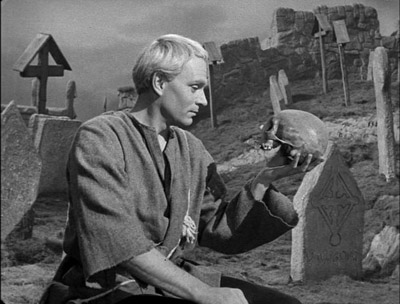
Randoms:
- Straight from the IMDB:
The final scene to be filmed was the famous shot of Olivier jumping off a high tower onto Claudius and killing him, because it was considered to be so dangerous that it was feared that Olivier would injure himself too badly performing the stunt to film any other scenes. Olivier emerged uninjured from the leap, but the stuntman doubling as Claudius was knocked out from the impact and lost two teeth.
And here it is:

- Speaking of uncredited performers like that poor toothless stunt-Claudius, this was one of the first appearances of the inimitable Christopher Lee. He's listed as a "spear-carrier," and I believe this is him (the still is from Hamlet's "mother and father is one flesh" speech from IV.iii.):

- He doesn't look much like Saruman or Count Dooku, or even the Hammer Dracula there, but compare the nose and cheekbones to this headshot from about ten years later (image stolen from here):

- That's gotta be him.
- And speaking of Hammer films and Star Wars (and cheekbones, for that matter), the most incongruous casting is Peter Cushing, as Osric. Osric is one of Shakespeare's most foppish characters. Branagh gave the role to Robin Williams, which should give you a pretty clear picture of the kind of manic silliness most actors bring the part. So this is your chance to see Grand Moff Tarkin at his most cheerful.

- Here his cheekbones look a little more Tarkinesque:

- And speaking of Lord of the Rings films, it seems to me that Peter Jackson's Ringwraiths:
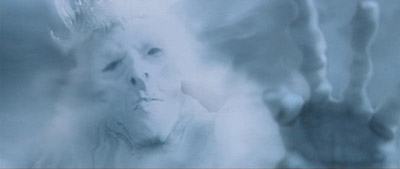
- Owe a bit to Olivier's version of Hamlet's ghost, who looms over Elisnore in a similar fashion:
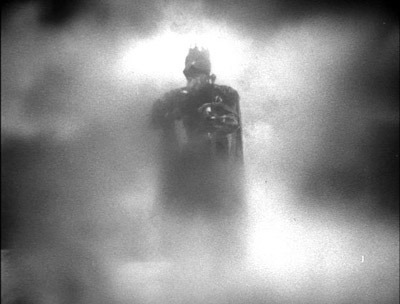
- And looks particularly familiar in close-up:

- I mentioned that Desmond Dickenson's cinematography looked a lot like what you'd see in a horror film. Apparently, horror film directors noticed: he went on to shoot Meet Mr. Lucifer, Horrors of the Black Museum, The City of the Dead, Trog, Tower of Evil, and Murder Ahoy. That last one is more of a mystery than a horror film, apparently, but still, what a title!
- Felix Aylmer's Polonius is pretty definitive. He doesn't capture any amazing insight into the character, but he's the best incompetent busybody I've seen (and his delivery of the list of genres the players know is perfect). Here he is at a typically self-important moment:

- Rafferty notes that the final duel has "an unsettling erotic charge." I think he may have just been confused by Laertes's unsettling codpiece.
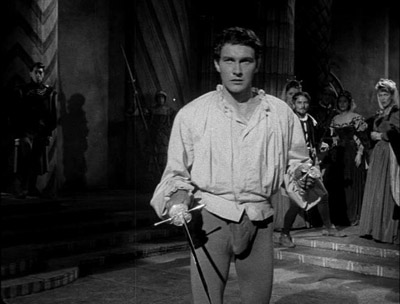
- Jean Simmons's version of Ophelia has not aged well. She's fine towards the beginning, but the mad scenes are difficult for anyone to sell, and viewers raised on method acting are unlikely to be impressed. That's true of most classically acted mad scenes, of course, so you can't really hold it against her.

- She'd previously played Estella in Great Expectations and this performance captures her at a critical point in her career. James Agee seemed quite taken with her, and gives her a lot of space in his review. But he had concerns about her career path:
We know what we are, the mad Ophelia says, in one of the most bemusing lines in the play; but know not what we may be. It is clear to Olivier, as to many others, that Jean Simmons is "an exceptionally bright and promising actress." It is not so clear what she may become. Olivier offered her the chance of a lifetime: a modest and gradual seasoning, first in minor roles, then in larger ones, at the Old Vic in Bristol. There is probably no more propitious training ground for legitimate acting in the English-speaking world. However, Jean has signed a five year, million-dollar contract with J. Arthur Rank. She will next appear in The Blue Lagoon, in which she wears a sarong, and dies, after having an illegitimate baby in a rowboat, somewhere in the South Pacific.Now that's dry reviewing.


25 comments:
A few things (my two small comments in the first paragraph):
First, I always like seeing great actors as extras in their early roles. My favorite is Tatsuya Nakadai's three seconds in Seven samurai. Second, if you are criticizing the movie for inclarity, that's a touch unfair. I've never read Hamlet (Nor do I much want to: Shakespeare wrote scripts) and I found the film perfectly followable.
Now, my biggest problem with this is the same problem I have with virtually all Western Shakespeare adaptations: Shakespeare. Although brilliant stage writing, I don't think fifty line soliloquies work all that well for the screen. The decision to ditch the script is, to me, on of the two reasons Kurosawa is the greatest Shakespeare adapter (the other reason being that he is Kurosawa).
Tiako,
You're the first person I've heard from who's never read Hamlet but has seen the Olivier version, so I'll defer to you on the clarity. Have you seen the Branagh version, or a less-cut version of the play? I'd love to know what you think about Rosencrantz and Guildenstern being missing.
I agree that the soliloquies are not ideal for film, and submit that no film of Shakespeare will seem like it's in its natural medium: it's not. But I think you undervalue Shakespeare's language, which is the reason people still read and adapt him. The question of whether to use his words doesn't really come up when you're working in Japanese to begin with.
I just wanted to add that I agree with your back-handed smackdown of the Almereyda version, which I thought was pretty lame.
Well, I'm not going to discuss Hamlet, per se, though I do think "indecisiveness" is hardly Hammie's problem. But I do want to say that Olivier's Richard III is the best movie adaptation (and I've seen maybe four or five) of that classic ever. I can't disparage film (or video) versions of Shakespeare -- that's the modern theater, if the play will live, that is where it must thrive. I would like to see more comparisons of the various versions side-by-side. Not so much for Hamlet or MacBeth or the other common fodder, but for, say, Measure for Measure, that I much admired in the BBC Shakespeare plays version (soon to be replaced) or other not so frequently-seen plays. ( Midsummer Night's Dream has some interesting film versions to discuss.)
Excellent review, Matt.
What do you think about the staging of the Mousetrap in Stoppard's film of Rosencratz & Guildenstern are Dead? I don't want to spoil it if you have not seen it, but I thought it was uniquely unsettling and superior to Olivier's?
Then again, I AM a child of the MTV generation.
Jeff,
Yeah, that kind of version, I end up focusing on all the ingenious or not-so-ingenious ways they've translated the various parts of the plot to the modern era (the Denmark corporation?) and not getting into the movie itself. I don't mind some of the trappings of modernity if they aren't so literal, however; I liked Loncraine's Richard III and most of Taymore's Titus Andronicus.
CCBC,
Haven't seen the Olivier Richard III yet but I'm looking forward to it. I know it only through Peter Sellars's version...
I've never seen a film of A Midsummer Night's Dream; it's not one of my favorites. Is there one you'd recommend?
I have watched (nearly) every film ever made of A Midsummer Night's Dream. They are all execrable. Max Reinhardt, Peter Hall, the BBC, Adrian Noble, Michelle Pfeiffer's husband - all made films that are clumsy, lumpen, unfunny and unbearably twee. It's baffling, because the play always seems to succeed on stage.
The Reinhardt one is at least worth seeing for the amazing ballet scenes, but Mickey Rooney as Puck will make you contemplate suicide.
Not Ultros,
Thanks! I saw Rosencrantz and Guildenstern are Dead while heavily sedated after having my wisdom teeth removed, so my memory of it is a little hazy. I should rewatch that.
I've always liked Olivier's version a tad less than the Gibson and Branaugh versions, but they all have their highlights.
One thing you didn't really touch on was the climactic swordfight. What a magnificent scene! Olivier staged one of the most dazzling swordfights in history, opening with that camera swooping away from the poisoned swords, and ending with Hamlet knocking Laertes' sword straight up *into the camera.* Terrific stuff. Maybe I'm alone in that opinion; I've never noticed anyone else mention it. Personally, I thought it was the highlight of the film.
Olivier seemed to play up Hamlet's eccentricity, as though he was more than a little bit mad from the beginning. Ophelia, too, seemed a bit nutty from the beginning; this worked in that you understood why they liked each other, but it was a bit off-putting.
For all its flaws, I really enjoyed Branaugh's version; it had a nice sense of old-fashioned spectacle, was beautifully shot and scored, and had some brilliant moments. I loved the cameos of Charlton Heston (who was probably never better) and Billy Crystal (who seemed like an odd choice, but was just perfect).
But for my money, the Zeffrelli/Gibson version is the superior film version. Fast-paced, intense, and with a brilliant central performance surrounded by a wonderful cast. It cut out a little too much of the play, which probably kept it from having the full emotional brunt it should have had, but still, an excellent movie.
Anyway, a superb review as always. I've loved every one of your reviews and can't wait for the next one.
Speaking of Hamlet/Star Wars connections, I've always liked this review, written in 1997, the year of both Star Wars Special Edition and Branagh's Hamlet:
http://us.imdb.com/Reviews/68/6840
Re: Midsummer Night's Dream. I'm not about to argue that it's great Shakespeare but the Reinhardt/Dieterle 1935 version is an, uh, amazing spectacle. Not only does Mickey Rooney play Puck but James Cagney plays Bottom! There's lots of other recognizable Hollywood faces (Olivia de Havilland is another major star). The semi-special effects are appealingly primitive. A fascinating spectacle! According to an IMDB review, Kenneth Anger has a bit part.
As for Olivier's Richard III, well, it may be the best Shakespeare adaptation as well as the best version of Crooked Dick. But with such a marvellously villainous villain, it's hard for any director to go wrong. (Except that every single print of Pacino's Looking for Richard should be incinerated.)
Amazing to think of the vast number of Shakespeare films (and videos) -- the various experiments with period and setting, approaches to staging, odd versions like Greenaway's Prosepero's Books...
BTW,in your review of Hamlet you don't mention the final tracking shot on the stairs as the camera registers, in the background, various symbols of love, death, marriage, etc., in effect doing an iconic narrative of the play.
Matthew,
I never really could enjoy reading Shakespeare. It's a bit like reading song lyrics, to me. Anyways, the only contact I've had with Hamlet is through Olivier (And that magnificent scene in My Darling Clementine, with perhaps the only good use of the "to be" speech outside of the play itself). As for clarity, I will admit that Hamlet's return threw me off for a bit, but I felt that was a small price to pay for two hours shorter running time.
Anyways, I've always felt that the long speeches--and even much of the dialog--are a bit like songs in musicals. Yes, they can work on film, but it is extremely difficult and, as often as not, it feels wrong. What I wish is that more filmmakers would take the route of ditching the script altogether but keeping he general plot and characters. So, yes, this does make me a supporter of that brief craze in the late 90s early 00s for taking the general concept from Shakespeare's plays and making them teenage rom-coms (although I disliked the few I have seen). I just wish that some more serious filmmakers would take cues from them.
As for Kurosawa, it's interesting, but he actually received some criticism for not using any translated lines from Macbeth in Throne of Blood (solely from this side of the Pacific, of course). Now granted, most of that criticism was from Bosley Crowther, who has been described as "famous for never getting the point of a Japanese film". But yes, you are correct.
Yes, it's funny that this should be Cushing and Lee's first teamup. Hamlet, then The Curse of Frankenstein.
I always thought that ringwraith bore a deliberate resemblance to Ernest Thesiger (of Bride of Frankenstein fame).
Brindled Cat,
Mickey Rooney can't be worse in A Midsummer Night's Dream than he was in Breakfast at Tiffany's.
jj gauthier,
I took screenshots of that opening swordfight camera move (I love it, too), but didn't find a place to write about it. So you're not alone in liking that scene; I thought the performance of The Mousetrap had the best camerawork, but the swordfight's a close second. I'm glad you're enjoying my reviews!
baf,
That's fantastic.
ccbc,
It is amazing how many different directions people take Shakespeare in; I've always thought this summed up the situation pretty well...
And no, I didn't mention the way the last tracking shot worked because I didn't notice its thematic importance; I just saw it as one last track through all the rooms we've seen in Elsinore. Wish I'd been paying more attention—good eye!
Tiako,
Bosley Crowther cracks me up. I hear what you're saying on the soliloquies; I thought they worked very well in the Loncraine Richard III, where they're direct-to-the-camera asides. So I think they can work, but they're a challenge.
Michael,
I think you might be right about that--I can kind of see it.
the Almereyda version
It has its flaws, but Bill Murray is a great Polonius.
jpb,
Bill Murray is a great anything.
Hello Matthew,
I am writing my dissertation on how the supernatural, in particular ghosts, is visualized in film and theater. I watched Olivier's Hamlet a long time ago but your post made me want to research further.
You might want to have a look at Thomas Ostermeier's ( Schaubuehne Berlin )version of Hamlet.I worked on it as a costume intern a while ago:
http://berlinfromwithin.blogspot.com/2009/03/when-it-comes-to-problem-of-how-to.html
( this is not my blog)
so much for my random comment.
hope you don't mind.
best,
jess
Hi, your blog is wonderful! I found it while searching for a review for Andrei Rublev. While I'd like to believe that handsome spear-carrier is the beloved (to a big lotr fan) Lee, the man in the headshot has a narrow chin without a cleft. Unless the spear-carrier's chin is prosthetic, I really don't think it's him. You could go to his website and probably find the answer? :)
Nicole
Post a Comment